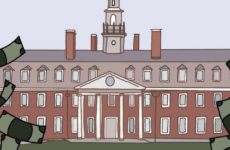In the winter of my eighth grade year, a determination to twist my hair consumed me. I inhaled all the information I could find about the history of dreadlocks. I listened to the stories of famous activists with locks. I spent hours before the mirror in deep contemplation. I meditated at length before deciding to dreadlock my hair because, to me, the decision’s implications were more than just a change in aesthetic. In locking my hair, I would follow in the footsteps of ancestors whose nappy heads symbolized defiance, declared self-love, and, too often, begot repression. My decision to dreadlock my hair wasn’t as simple as choosing a flattering hairstyle off a chart; therefore, I have been alarmed by the frequency with which white celebrities like Kylie Jenner have, as a fashion statement, donned a hairstyle that represents a history unknown to them — a history written in the blood and tears of an oppressed people.
It is from the experience of having my own culture appropriated that I approach the recent appropriation of Hawaiian culture by some members of our community, namely the Boar Pen. The Boar Pen decided to sponsor a Hawaiian-themed sports game, to which attendees were encouraged to wear Hawaiian shirts and bring water-sport accessories. While I cannot speak to how an indigenous Native Hawaiian might feel about this, I concur with the thoughts of Hawaiian journalist and activist, Anne Keala Kelly, who described haoles, or white people, who “throw those parties and give those lei” as “eating vomit, culture vomit, to be exact.” To Kelly, white use of use of historical Hawaiian cultural items is “so clearly intended to mean as much as one of those party favor whistles you can find at a kid’s birthday celebration.” I share Kelly’s sense of injustice in the face of ignorant opportunists, like Kylie Jenner, treating meaningful traditions like fashion statements and cheap thrills. For those who know the history of traditions like dreadlocks, these practices are worth more than just their appearance; and yet, this significance is lost on those who take on cultures as a costume or theme.
In addition to ignoring the history and significance of Hawaiian cultural practices, Boar Pen and other appropriators of Hawaiian culture ignore the violent repression that indigenous Hawaiians have faced and continue to face as a consequence of their cultural practices. Imperialist encroachment on cultural practices is often accompanied or facilitated by the murder and conquest of indigenous peoples. In the case of Hawaii, Kelly asserts “killing us off in multiple ways made it easier for haole people to encroach on everything Hawaiian. Humiliating us and our cultural traditions has been very effective.” For many Hawaiian people, mainstream depictions of the islands as a haven for beach-bum, continental U.S. citizens are a reminder of the force with which the imperialist U.S. invaded and commoditized their home. This process, which one political scientist described as “the utter degradation of [Hawaiian] culture and [Hawaiian] people under corporate tourism,” had visceral and memorable impacts on indigenous people and their psychopathology. The Boar Pen and other cultural appropriators cannot overlook and erase the lasting consequences of U.S. imperialism and the tourism industry, consequences derived from Hawaiian culture’s commodification, of which events like Boar Pen’s make light.
Similarly, those who appropriate Black hairstyles, like my own, wish to forget the physical violence and institutional oppression with which these hairstyles have long been associated. As recently as 2014, the United States army banned dreadlocks, denigrating the traditional Black hairstyle as “unkempt” and “matted.” Those with natural Black hairstyles face these repressive notions in part because of their hairstyles’ history of opposing white supremacy: many natural movements, like the Afro movement of the ‘60s, have emphasized Black beauty as a means to combat inequality and hatred. Marginalized peoples’ cultural practices are often inextricable from those peoples’ heinous histories, and Boar Pen should not be allowed to brush over the hard-to-swallow aspects of their appropriative events.
The Boar Pen’s invitation to a “Hawaiian themed” sports event demeaned and trivialized ancient and significant cultural practices, which the event sought to make a cheap gimmick to encourage participation. In addition to trivialization, events like the Boar Pen’s are guilty of perpetuating racist and stereotypical depictions of Hawaiian culture as only bikinis and Hawaiian shirts. I am reminded of Tau Kappa Epsilon chapter that held a “MLK Black Party,” at which Black culture was equated with baggy basketball jerseys, bandannas, and backward baseball caps. The danger in stereotypes like these lies in their ability to reduce a people to a caricature, thereby enabling imperialism. Hawaiian culture is more than floral shirts and swimwear, and to be so reductionist is to enable oneself to ignore the diversity of the islands and, therefore, to ignore the island’s indigenous people.
Discussions about cultural sensitivity are always inhibited by a singular fear: where does it end? Ultimately, the only suggestion I can offer is that we should all apply scrutiny to the cultural practices we replicate. Before announcing a Hawaiian-themed event, ask yourself: do I know enough about Hawaiian culture to educate someone else? Could I detail the origins of the cultural practices I wish to use, and am I aware of the power dynamics from which I benefit over those of this culture? Has someone of this culture expressed discomfort about me or others engaging in this activity? If you can’t answer all these questions, it’s probably time to put your lei away.





